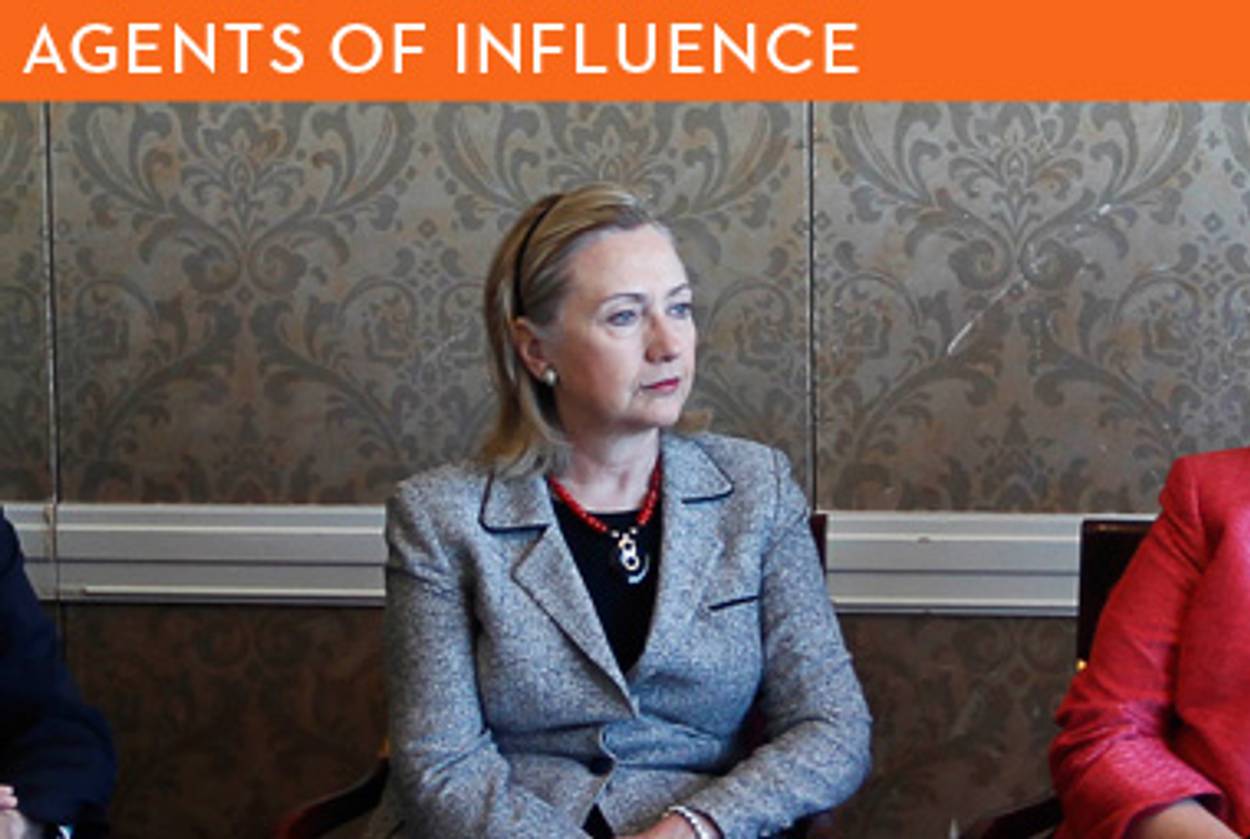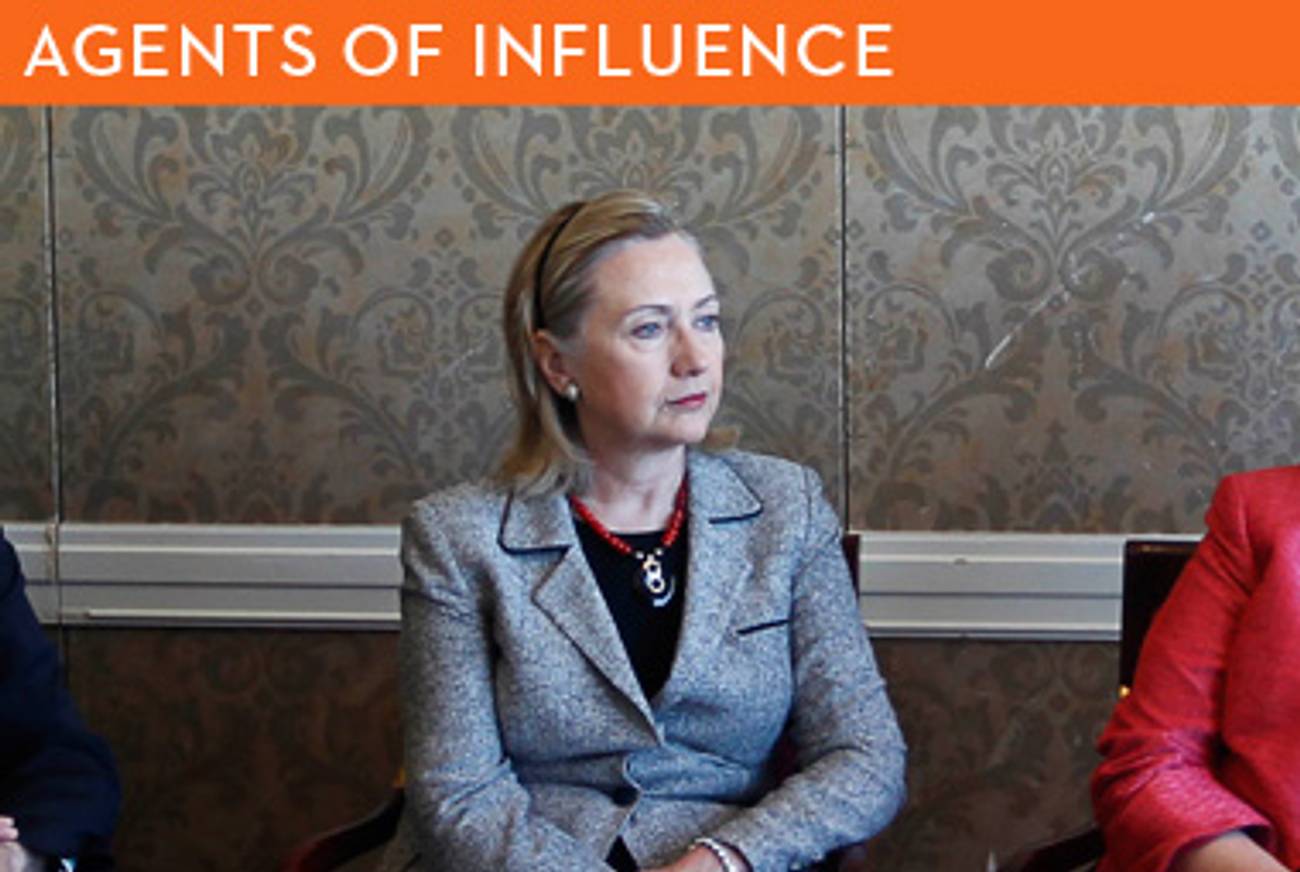False Accounting
Hillary Clinton told Arab leaders to clean house last week, encouraging an age of accountability. But until the Arab world has democratic institutions and an engaged populace, her words may be meaningless.




In the Middle East, reality always overtakes rhetoric in the end—whether that rhetoric comes from an Arab president on the official government TV station, a preacher in the pulpit, or an American diplomat with a microphone. Take, for instance, last week, when Secretary of State Hillary Clinton stood up in Doha, Qatar, and told the Arab leaders gathered for a conference on democracy that they need to get their house in order. “While some countries have made great strides in governance, in many others, people have grown tired of corrupt institutions and a stagnant political order,” Clinton said. “Those who cling to the status quo may be able to hold back the full impact of their countries’ problems for a little while, but not forever.”
If it weren’t for the historic events in Tunisia—where for the first time in Arab history a people rose up to send their ruler packing—people in Rabat, Morocco, where I’m traveling for the next week, and throughout the region would still be talking about Clinton’s speech. What made it surprisingly welcome is that, up until last Thursday, the Obama Administration had been putting as much distance as possible between itself and President George W. Bush’s “Freedom Agenda.” It wasn’t clear whether President Barack Obama believes that democracy promotion is likely to destabilize the repressive and volatile political systems of the Arab world—and that the survival of those regimes would be in America’s best interest—or if he was just following an anything-but-Bush handbook.
But Clinton picked up the gauntlet and laid it at the feet of Arab regimes, timed perfectly to herald an age of Arab accountability: Right after the Tunisians deposed their president-for-life, Zine El Abidine Ben Ali, sealed indictments were handed down in the United Nations investigation of the assassination of former Lebanese Prime Minister Rafiq Hariri, and while the names are yet to be revealed, the indictments are expected to identify Hezbollah members as well as government officials of its Syrian and Iranian sponsors.
Tunisia’s so-called Jasmine Revolution is the culmination of demonstrations that started with the self-immolation of a produce vendor in Sidi Bouzid after his goods were confiscated. Other suicides followed, accompanied by widespread protests against the lack of jobs, housing, freedom of speech, and food price inflation and corruption. Police and security forces shot and killed demonstrators, but when the army refused to turn on their countrymen, Ben Ali fled the country for Saudi Arabia last Friday, leaving Tunisia without a government and Tunisians elated with the rarest of achievements: vanquishing an Arab strongman.
In the days following Ben Ali’s exit, the Tunisian army skirmished with security forces still loyal to the ousted president. One hopes the military can now serve as the guarantor of a more or less peaceful transition as Tunisia takes its first steps toward a more democratic political culture. The more pessimistic interpretation is that the stark image of city streets vacant of any human beings except those who are armed to the teeth is a living tableau of Middle Eastern political culture. Here the masses are merely props to be chewed up and tossed away, and the real action is nothing but security chiefs and generals in a fight to the death.
That is to say, as thrilling as it is to see a people take its own destiny in its hands, there is reason to be concerned—for Tunisians and for the rest of the region, where protests seem to be gathering momentum. Algeria, Egypt, and the Islamic Republic of Mauritania have already reported cases of self-immolation—an ostensibly selfless and heroic gesture that is unfortunately reminiscent of one of the Middle East’s more popular forms of political expression: the suicide bombing. Something is happening in the region—in fact, has been happening for some time—that is simply not going to be solved with the downfall of one dictator.
***
Which is why it’s not surprising that the Moroccans I’ve met here, on a trip sponsored by the Moroccan American Center for Policy, do not share the excitement with which the Jasmine Revolution has been received in many corners of the U.S. policy establishment. Some of the Moroccan diplomats, human rights activists, and parliamentarians I’ve spoken to even believe that Obama’s carefully modulated statement on Tunisia was too enthusiastic, given that no one has any idea yet whether democrats or Islamists or the army will wind up in power, and what the consequences will be.
Because many of these Moroccan officials are close in one way or another to the ruling regime, it is reasonable to interpret their vivid worries about “security”—all couched in terms articulating brotherly concerns and hopes for the citizens of another Maghreb state—as the fears of a ruling order imagining a bad end for itself. However, while it is important to understand the worries of any elite class in terms of its own self-interest, it is also foolish to discount the misgivings of those who actually have experience in Arab politics and governing Arab people.
From here in the region, it is perhaps easier to see the fundamental problems with Clinton’s welcome brand of Western-style honesty. For instance, what she calls “corruption” is just one family or tribe advancing the interests of its own clique while shutting out the others. Corruption as such is standard operating procedure in the Middle East. Only a lunatic, or an American public official, would give money to an armed gang with uncertain loyalties.
In Doha, Clinton argued that “[i]t is important to demonstrate that there is rule of law, good governance, and respect for contracts to create an investment climate that attracts businesses and keeps them there.” The problem here is that this isn’t necessarily true—a fact borne out by Ben Ali’s Tunisia. The regime was corrupt to the core—Ben Ali’s wife’s family had a hand in virtually every business venture in the country—but the country’s pro-business climate and liberalized economy won praises from all corners, including the IMF. Good governance then had nothing to do with building Tunisia’s economy or creating the country’s middle class, for it was all crafted by the heavy hand of a dictator.
“If leaders don’t offer a positive vision and give young people meaningful ways to contribute, others will fill the vacuum”—namely, “extremist elements, terrorist groups and others who would prey off desperation and poverty,” Clinton warned her audience in Doha. Alas, this isn’t true either. Visitors to the police state that Ben Ali ruled admired the country’s relatively open atmosphere—open, except for political dissent—but its secularism, educational system, and the relative freedom of women, had very little to do with a positive vision. Rather, it was all engendered by the single-minded obsession of a tyrant who perceived, perhaps rightly, that the country’s Islamist movement constituted his most serious and best-organized opposition. It is the fact that Ben Ali thoroughly repressed the Islamists and eradicated any evidence of their potent symbols and discourse that gave Tunisia’s its left-bank flair.
What is more depressing is that while we believe poverty, hopelessness, and despair may pave the way for extremist elements and terrorist groups, we know that democracy has empowered them where repression sidelines them. Even avid Bush partisans cannot ignore the fact that the gospel of democratization propagated by Bush and his Secretary of State, Condoleezza Rice, during the president’s second term helped bring Hamas to power in Gaza and strengthened Hezbollah’s hand in Lebanon.
There is a reason why a famous Arab dictum has it that 100 years of tyranny is preferable to one day of chaos. It is meant to remind us of the nature of man, the political animal, who cannot foresee the consequences of his actions. The Arabs’ ancients would have been right to fear how an uprising that began in a suicide might end. If this saying is frequently held up as an example of Arab timidity, the same might be said of any society, and the fact is that the Arabs have stood up before and will invariably do so again. Still, it is unlikely that the uprising in Tunisia will serve as a model for the rest of the region. The Tunisian middle class succeeded where, for example, the Iranians failed in June 2009 only because the divisions in Ben Ali’s security apparatus were decisive. Presumably, rulers around their region right now are worried less about crowds in the street than about whether their intelligence officials are happy with their latest paycheck.
Moreover, it is unseemly for Americans to gloat about the fate of Arab regimes when the real issue is Arab people, like those getting shot in the streets of Tunisian cities or setting themselves on fire in Cairo. Their problems are not going to be solved with the exit of one Arab dictator—or even the whole pack of them, from Riyadh to Algiers. What’s wrong with Arab reform is that in most cases the institutions that need to be fixed do not yet exist—a fact that makes the content, though perhaps not the rhetoric, of Clinton’s speech no less irrelevant to Arab reality than the high-flown language of democracy favored by Condoleezza Rice. If there is a formula to fix what’s wrong with the region, no one has it.
Lee Smith is the author of The Consequences of Syria.
Lee Smith is the author of The Permanent Coup: How Enemies Foreign and Domestic Targeted the American President (2020).